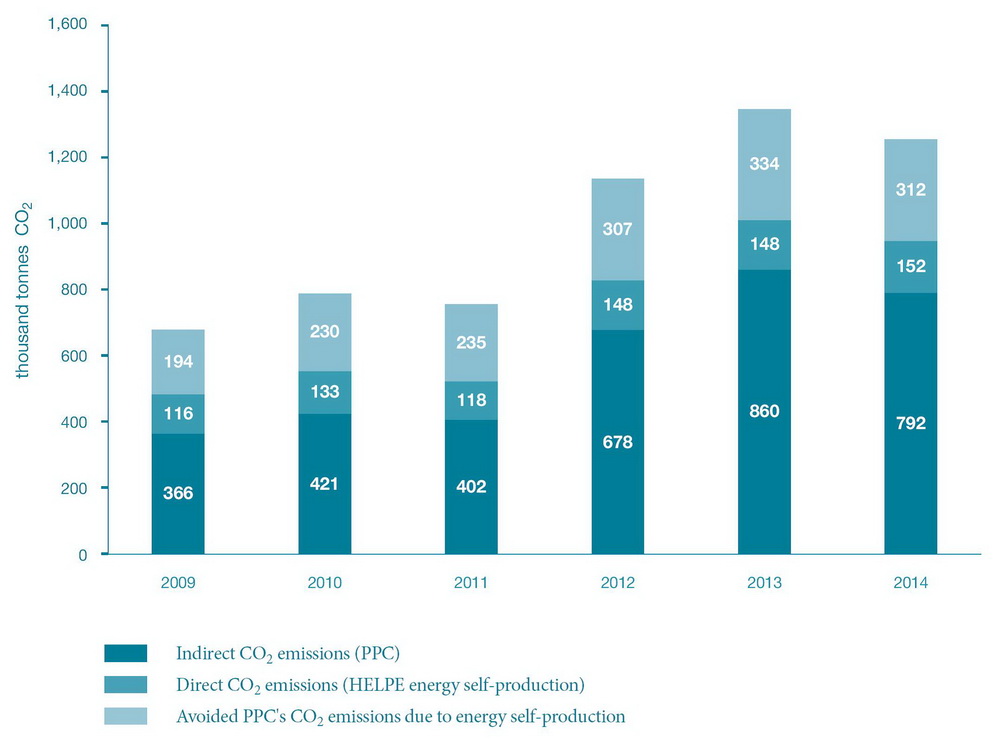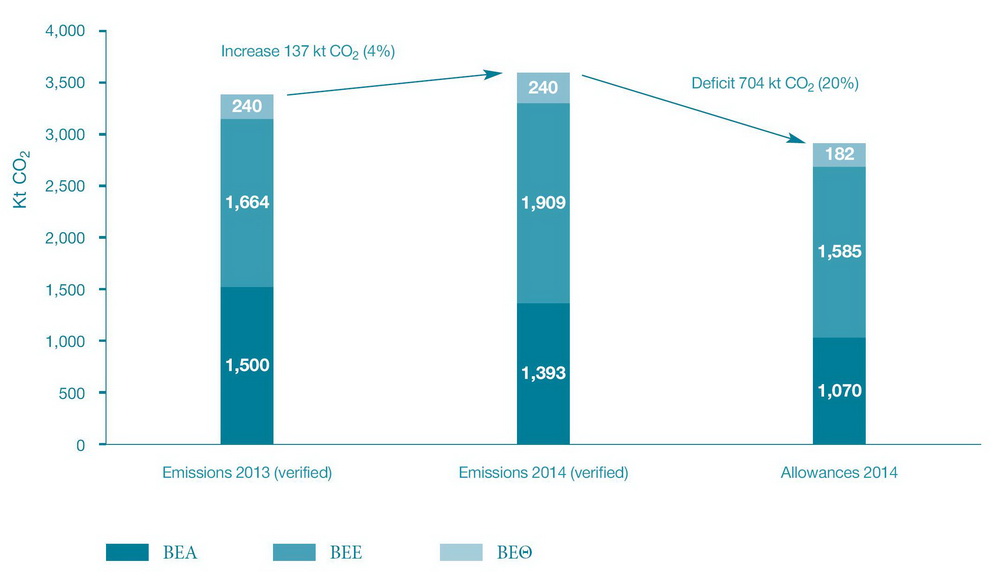The policies on energy and climate change constitute significant challenges for the Group, particularly for oil refining, as one of the main productive activity sectors. With the continued increase in energy demand, the refining sector has a vital role in ensuring energy supply. At the same time, greenhouse gas emissions need to be reduced accordingly, in all sectors of the economy, so as to effectively tackle climate change. Moreover, Greece as a country with a large coastal front needs to gradually begin strategic planning for adaptation and tackling the impacts from climate change.
The Group positively contributes to initiatives combating climate change andto the reduction of greenhouse gas emissions through increasing its energy efficiency in production processes and investing in renewable energy sources.
CHP units, for combined heat and power generation, operate at all of the Group’s refineries. These units contribute to the avoidance of significant CO2 emissions (Chart 4.2), which would be emitted if the self-produced electricity was generated from a provider (such as PPC), using a different fuel mix.
Chart 4.2: Contribution of self-produced electricity at the Group’s domestic refineries and CO2 emissions avoided, due to the self-produced electricity, in line with those of the total consumption

When it comes to the monitoring and reporting of emissions, HELLENIC PETROLEUM Group systematically monitors direct CO2 emissions (Scope 1) as well as indirect emissions (Scope 2 and 3) to the maximum extent of its activities. Indicatively, the estimated CO2 emissions from the sea transport of raw materials and products and the estimation of the carbon footprint (carbon footprint project) of all activities in the Group's office buildings (Headquarters and Aspropyrgos, Elefsina and Thessaloniki refineries - MyClimate Certification) is reported.
The Group's refineries have participated, since its formation, in the EU’s Emissions Trading System (EU ETS), while as of 2013 follow all procedures for monitoring, calculation and verification of emissions according to the regulations of the third phase of the EU ETS 2013-2020. It is underlined that, during the EU ETS 3rd Phase, the compliance costs have increased significantly, due to the smaller number of allowances in relation to the actual emissions.
It is noted that the future of the EU ETS will directly depend on its planned structural reform, as well as on overall EU policies concerning energy and climate. The Group closely monitors these developments and participates in the pertinent consultation process, so as to protect the competitiveness of European refining.
Chart 4.3 presents the verified CO2 emissions of the three refineries, for 2013 – 2014, as well as the allowances for 2014.
Chart 4.3: 2013-2014 verified CO2 emissions of the Group’s refineries

Biofuels
HELLENIC PETROLEUM is voluntarily exploring the potential use of bioethanol as a gasoline component through a relevant research program conducted in cooperation with the Fuels and Lubricants Laboratory of the National Technical University of Athens. This research program is investigating the pilot introduction of bioethanol, as a raw material for bio-ETBE (ethyl-tertio-butyl-ether) production which will be used as a component in gasoline. N.B. Bioethanol can either be blended directly or as an ingredient with gasoline and can be used in conventional gasoline vehicles.
Biofuels are the only direct substitute for fossil fuels currently available on a large scale for transport fuels. Their use contributes to more environmentally friendly transport, without any further need for major modifications required in vehicles and distribution networks. Biodiesel, as a fuel that possesses properties similar to those of diesel, can be used in most conventional diesel vehicles.
Table 4.4: Biodiesel received and used as a conventional diesel additive
| Year |
Βiodiesel (m3) |
% v/v in diesel |
| 2006 |
46,580 |
2.01 |
| 2007 |
79,010 |
3.65 |
| 2008 |
62,788 |
3.04 |
| 2009 |
68,961 |
3.84 |
| 2010 |
108,063 |
6.39 |
| 2011 |
78,623 |
6.37 |
| 2012 |
100,993 |
6.49 |
| 2013 |
101,269 |
6.73 |
| 2014 |
112,891 |
7.00 |
Renewable Energy Sources
HELPE Renewables 100% owned by HELPE is the company developing the RES portfolio of HELPE. A total of 1,4 MW of photovoltaic (P/V) stations installed on HELPE Group property and a 7 MW Wind park at Pylos, Messinia, are already in operation.
In addition, three photovoltaic projects are at various development stages, with a total installed power of 11 MW. and five 25 MW biomass projects using agricultural residues as source of energy are under development.
Moreover, in cooperation with LARCO, a portfolio of 148 MW of photovoltaic, wind and hybrid projects is also under development.